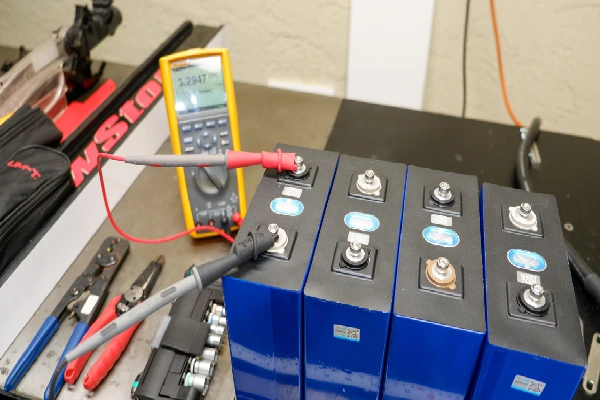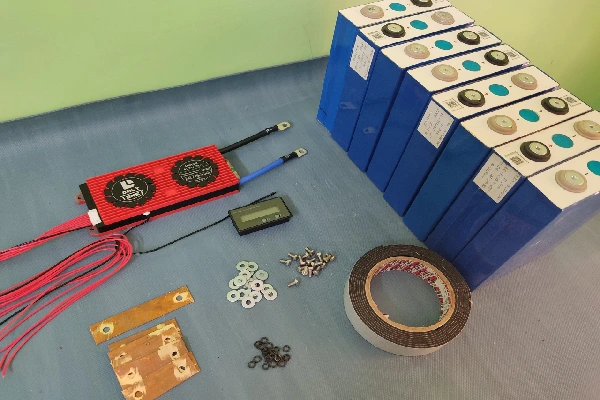Building a LiFePO4 (Lithium Iron Phosphate) battery pack can be a rewarding and practical project. Whether you’re a DIY enthusiast or need a reliable power source for your devices, understanding these batteries and how to assemble them is essential.
Let’s dive into the process and explore each step in detail.
Part 1. Understand LiFePO4 cell and LiFePO4 battery pack

Before starting, it’s crucial to understand the difference between a LiFePO4 cell and a LiFePO4 battery pack:
- LiFePO4 Cell: This is a single battery unit with a nominal voltage of 3.2V. It’s the basic building block for creating larger battery packs. Each cell has its capacity, measured in ampere-hours (Ah), and can be used individually for small applications.
- LiFePO4 Battery Pack: A battery pack is made up of multiple cells connected. How these cells are connected determines the overall voltage and capacity of the pack. Connecting cells in series or parallel allows you to create a battery pack that meets specific voltage and capacity requirements for larger applications like electric vehicles, solar energy storage, or backup power systems.
The relationship between cells and packs is akin to building with blocks: individual cells are the blocks, and the battery pack is the structure you build with those blocks. Understanding this relationship is the first step toward creating a functional battery pack.
Part 2. Understand LiFePO4 battery pack series and parallel connection
The configuration of your battery pack, whether series or parallel, significantly impacts its performance. Here’s how each connection works:
- Series Connection: Increases the voltage of the battery pack. To connect cells in series, link the positive terminal of one cell to the negative terminal of the next. For instance, connecting four 3.2V cells in series results in a 12.8V battery pack (3.2V x 4 = 12.8V). The capacity (Ah) remains the same as a single cell, but the voltage is multiplied by the number of cells.
- Parallel Connection: Increases the capacity (Ah) of the battery pack. To connect cells in parallel, link all the positive terminals together and all the negative terminals together. Four 3.2V cells connected in parallel still have a voltage of 3.2V, but the capacity is quadrupled. This means the battery can deliver more current over a longer period.
Combining these two methods allows you to customize your battery pack to meet your specific power requirements. For example, a combination of series and parallel connections can provide both the necessary voltage and capacity for your application.
Part 3. How to build a LiFePO4 battery pack?
Building a LiFePO4 battery pack involves several steps. Here’s a detailed guide to help you through the process:
Step 1: Gather Materials
To build your battery pack, you will need the following materials:
- LiFePO4 Cells: The number of cells depends on your desired voltage and capacity.
Battery Management System (BMS): Essential for monitoring and balancing the cells, preventing overcharging and deep discharging. - Connectors and Wires: These are used to link the cells together.
- Insulating Materials: To ensure that there are no short circuits.
- Battery Case: To house and protect the battery pack.
Step 2: Arrange Cells
Decide on the configuration of your battery pack (series or parallel). Place the cells accordingly in a secure and insulated environment. For example, arrange four cells in series if you want a 12.8V pack.
Step 3: Connect Cells
Connect the cells using solid connectors or wires. Ensure that all connections are tight and well-insulated to prevent short circuits. If you’re building a pack with both series and parallel connections, be clear about which cells are connected in series and which in parallel.
Step 4: Install BMS
The Battery Management System (BMS) is crucial for the safety and efficiency of your battery pack. Connect the BMS to each cell as per the manufacturer’s instructions. The BMS will monitor the voltage and temperature of each cell, balancing them during charging and discharging to ensure longevity and prevent damage.
Step 5: Secure the Pack
Place the assembled cells and BMS into a battery case. Ensure that all components are securely fastened and there’s no movement inside the case. Proper insulation is critical to prevent short circuits and ensure the safety of your battery pack.
Part 4. LiFePO4 battery pack key parameters
Understanding the key parameters of your LiFePO4 battery pack is crucial for ensuring it meets your needs. Here are the primary parameters to consider:
- Voltage (V): This is the total voltage of the battery pack, determined by how many cells you connect in series. For example, four cells in series, each with 3.2V, will give a total voltage of 12.8V.
- Capacity (Ah): The capacity of the battery pack, measured in ampere-hours, depends on how many cells are connected in parallel. If each cell has a capacity of 10Ah and you connect four in parallel, the total capacity will be 40Ah.
- Energy (Wh): This is the total energy stored in the battery pack, calculated by multiplying the voltage by the capacity (Wh = V x Ah). For instance, a 12.8V battery pack with a capacity of 40Ah will have an energy capacity of 512Wh.
- Max Discharge Current: The maximum current the battery pack can safely deliver. It’s influenced by the specifications of the individual cells and the BMS. Exceeding this current can damage the cells or reduce their lifespan.
- Cycle Life: Cycle Life refers to the number of complete charge/discharge cycles the battery can undergo before its capacity falls below a certain percentage of its original capacity (usually 80%). A higher cycle life means better durability and longer service life.
Understanding these parameters helps you know what your battery pack can and cannot do and ensures it will meet your power requirements.
Part 5. How to judge whether the LiFePO4 battery pack is good?
If you are a buyer, evaluating the quality of a LiFePO4 battery pack is essential.
Here are some tips to help you judge whether a battery pack is of good quality:
- Voltage and Capacity: Ensure the battery pack meets your voltage and capacity requirements. The manufacturer should clearly state this information.
- BMS Quality: A good Battery Management System (BMS) is critical for the safety and longevity of the battery pack. Check if the BMS can handle the required current and has overcharge, over-discharge, and short-circuit protection features.
- Build Quality: Inspect the battery pack for secure, well-insulated connections and a sturdy casing. Poor build quality can lead to safety hazards and reduce the battery’s lifespan.
- Cycle Life: A higher cycle life indicates better durability. Look for battery packs with a cycle life that matches your usage expectations.
- Reviews and Tests: Check product reviews and any available test data. Other users ‘ real-world experiences can provide valuable insights into the battery pack’s performance and reliability.
Part 6. Factors affecting the LiFePO4 battery pack performance
Several factors can impact the performance of your LiFePO4 battery pack. Understanding these factors will help you optimize its performance and lifespan:
- Temperature: Extreme temperatures, both high and low, can reduce the efficiency and lifespan of the battery pack. Ideally, keep the battery between 0°C and 45°C during operation and between -20°C and 25°C during storage.
- Charge/Discharge Rates: Charging or discharging the battery too quickly can stress the cells, reducing capacity and cycle life. Follow the manufacturer’s recommended charge and discharge rates.
- Balancing: Ensuring all cells in the battery pack are balanced is crucial. Unbalanced cells can lead to reduced performance and safety issues. The BMS plays a vital role in balancing the cells.
- Storage Conditions: Store the battery pack in a cool, dry place when not in use. Long-term storage at high temperatures or in a fully charged or discharged state can harm the cells.
- Usage Patterns: Frequent deep discharges or leaving the battery at a low charge for extended periods can negatively affect its health. Try to maintain a moderate state of charge during regular use.
Considering these factors, you can ensure that your LiFePO4 battery pack performs optimally and has a long service life.
Building a LiFePO4 battery pack is a practical and rewarding project that can provide reliable power for various applications. Following these detailed steps and tips, you can create a battery pack that suits your specific needs and ensures safety and efficiency.
Related Tags:
More Articles

Paper Battery vs. Flexible Battery: What’s the Difference and Which Is Better?
Paper vs. flexible batteries: learn the key differences, benefits, and which power source fits best for wearables, sensors, and smart tech.
What to Know Before Buying a Tiny LiPo Battery for Your Project
Tiny LiPo batteries are powerful and compact. Learn how to choose the right one for your project with specs, safety, and charging tips.
Bloated LiPo Battery: Will It Explode?
Will a bloated LiPo battery explode? Discover the causes, risks, safety steps, and expert tips to avoid disaster and protect your gear. Must-read safety guide!
12V 100Ah Lithium Ion Battery Price: Full Guide
Learn about 12V 100Ah lithium-ion battery price, from cost ranges to best brands, hidden fees, and how to get the best deal. A must-read for smart buyers!
Resistance and Conductivity: What It Means for Your Lithium Batteries
Resistance and conductivity impact lithium battery performance, lifespan, and safety—learn how they work and why they matter.





